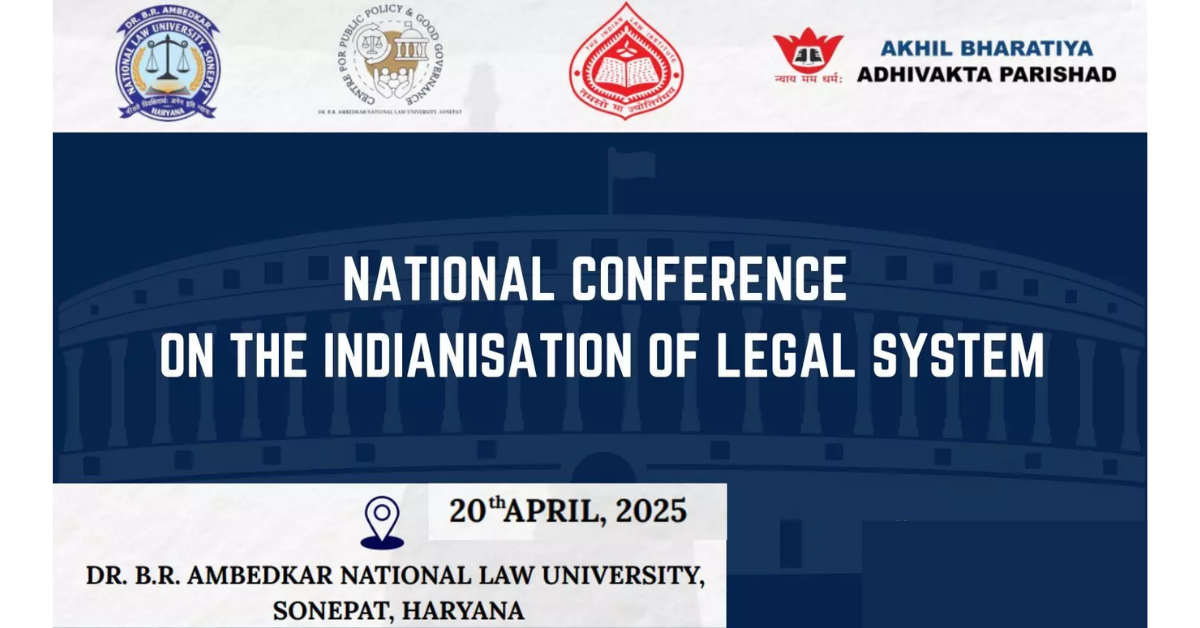The Dr. B.R. Ambedkar National Law University, Sonepat, is organizing a National Conference on the Indianisation of the Legal System, inviting academicians, legal practitioners, researchers, and students to contribute their insights on the evolving legal framework in India.
The concept of Indianisation of the legal system has gained significant importance in recent years. With the increasing focus on making Indian laws more accessible, efficient, and aligned with indigenous values, this conference aims to provide a platform for intellectual discussions and policy recommendations.
If you are passionate about legal reforms, Indian jurisprudence, and contemporary legal challenges, this is your chance to showcase your research and contribute to the legal discourse in India.
Conference Overview
📌 Event Name: National Conference on Indianisation of Legal System
📌 Organized by: Dr. B.R. Ambedkar National Law University, Sonepat
📌 Event Date: (To be announced)
📌 Mode: Offline/Hybrid (Details to be confirmed)
📌 Location: Dr. B.R. Ambedkar National Law University, Sonepat, Haryana
📌 Call for Papers Deadline: (To be updated)
📌 Official Website: University Website
📢 Interested researchers are encouraged to submit their papers before the deadline.
Theme & Sub-Themes of the Conference
The Indianisation of the legal system revolves around adapting laws, procedures, and judicial approaches to better reflect Indian values, traditions, and societal needs. The conference will focus on:
Main Theme:
🔹 Indianisation of Legal System: Challenges & Future Prospects
Sub-Themes:
✔ Evolution of the Indian Legal System & Colonial Influence
✔ Impact of Indian Culture & Traditions on Legal Reforms
✔ Use of Vernacular Languages in Judiciary
✔ Judicial Delays and the Need for Simplification of Legal Procedures
✔ Legal Pluralism and Indigenous Dispute Resolution Mechanisms
✔ Role of Dr. B.R. Ambedkar in Legal Reforms
✔ Comparative Analysis of Indian & Foreign Legal Systems
✔ Recent Supreme Court Judgments Promoting Indianisation of Law
✔ Legal Education & Its Role in Indianising the System
📢 Researchers can submit papers on these or related themes to contribute valuable insights.
Why is the Indianisation of the Legal System Important?
The Indian legal system is still deeply influenced by British colonial laws, making legal proceedings complex and inaccessible for many citizens. The need for Indianisation is emphasized by various judges, scholars, and policymakers, including the Hon’ble Chief Justice of India.
Key Objectives of Indianisation:
✅ Simplification of Legal Language – Making laws more understandable for the common citizen.
✅ Use of Regional Languages in Judiciary – Reducing dependency on English in legal proceedings.
✅ Promotion of Alternative Dispute Resolution (ADR) – Encouraging Lok Adalats and Mediation Centers.
✅ Adaptation of Laws to Indian Culture – Recognizing the unique social and cultural fabric of India.
✅ Faster Justice Delivery – Reducing delays in court cases with more efficient legal procedures.
📢 This conference will highlight the ongoing reforms and discuss potential strategies to accelerate the Indianisation process.
Guidelines for Paper Submission
If you wish to contribute a research paper, ensure it adheres to the following guidelines:
1. Paper Format & Submission:
✅ Word Limit: 3000–6000 words (excluding references)
✅ Font & Size: Times New Roman, 12 pt (Main Text), 10 pt (Footnotes)
✅ Citation Style: Bluebook 20th Edition / OSCOLA
✅ File Format: Microsoft Word (DOCX) / PDF
✅ Plagiarism Limit: Less than 15%
2. Abstract Submission:
✔ Abstracts should be 250–300 words with 5 keywords.
✔ Submit along with a brief bio of the author(s) (100–150 words).
3. Important Dates:
📅 Abstract Submission Deadline: (To be announced)
📅 Full Paper Submission Deadline: (To be announced)
📅 Conference Date: (To be announced)
📢 Papers must be submitted via email to the official conference email ID.
Who Can Participate?
The conference welcomes:
🎓 Law students & scholars
👨⚖️ Legal professionals & advocates
🏛 Judges & policymakers
📖 Academicians & researchers
📢 NGOs & social activists working on legal reforms
📢 Participants can present papers individually or in teams (max 2 authors per paper).
Benefits of Participation
✅ Publication Opportunity: Selected papers may be published in a peer-reviewed journal.
✅ Networking with Experts: Meet renowned legal scholars, judges, and policymakers.
✅ Certificate of Participation: Receive a recognized certificate from the university.
✅ Recognition & Awards: Best papers may receive awards and special mentions.
📢 This is a great opportunity to showcase your legal research on a national platform!
How to Register for the Conference?
To register for the conference, follow these steps:
Step 1: Visit the Official Website
✔ Go to the university’s official website and navigate to the conference section.
Step 2: Fill Out the Registration Form
✔ Provide details like name, designation, institution, and research topic.
Step 3: Submit Your Abstract
✔ Upload your abstract and author details as per the guidelines.
Step 4: Pay the Registration Fee (if applicable)
✔ Make the required payment through online banking or UPI.
Step 5: Confirmation & Paper Submission
✔ Once accepted, submit the full paper before the deadline.
📢 Check the official website for registration fees and deadline details.
FAQs on the Conference
Q1: Can I submit a paper on a topic not listed in the sub-themes?
✅ Yes, as long as it is related to the Indianisation of the legal system, it will be considered.
Q2: Will the conference be online or offline?
✅ The conference is expected to be offline or hybrid. Further details will be provided soon.
Q3: Can I attend the conference without submitting a paper?
✅ Yes, you can attend as a participant without presenting a paper.
Q4: Will I receive a certificate for participation?
✅ Yes, all attendees and paper presenters will receive an official participation certificate.
Q5: Where can I get more details?
✅ Visit the official university website for complete guidelines.
Conclusion: Don’t Miss This Academic Opportunity!
The National Conference on Indianisation of the Legal System is a great opportunity for legal scholars, students, and professionals to contribute to India’s legal transformation. Whether you are a researcher, advocate, or law student, your insights can help shape the future of Indian law.
📢 Submit your research today and be a part of this significant legal discourse!
👉 For registration & paper submission, visit: University Website

